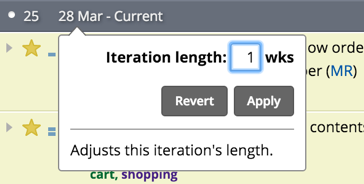Defining start dates
The iteration start day and date for the current and future iterations are determined by a combination of your Start Iterations On day, Project Start Date, and Iteration Length. You can adjust these in Project Settings.
The Start Iterations On day is the day of week you prefer your iterations to start on, and defaults to Monday. Set a Project Start Date if you want the project’s first iteration to start earlier than the iteration in which the first completed story was accepted on. (The day of the date you choose must match the Start Iterations On day).
If you leave Project Start Date blank, Tracker will use the start date of the iteration which contains the first accepted story. These settings, combined with the project’s iteration length, will determine the date ranges of all iterations.
Changing the iteration start date
If your project’s iteration length is more than one week, it can happen that the date the iteration starts in Tracker doesn’t match the date your team’s iteration actually begins. This can occur if you override the length of a completed iteration, or change the iteration length in Project Settings. For example, say your current iteration begins February 1, and now you’ve decided to change from one- to two-week iterations. As a result of this change, your current iteration may now have shifted to February 8.
When this occurs, you may think to change your project start date to correct the issue. However, editing your project start date in your Project Settings may not help. If you have a story that was accepted prior to the start date you indicated in settings, Tracker will have to use that story’s accepted date instead.
The most effective way to change back to the correct iteration start date is to manually edit the length of one previously completed iteration (in weeks) to effectively cause all future iterations to shift up or down as a result.
For instance, if your project’s iteration length is one week, and you want your current iteration to shift ahead by a week, simply edit one previously completed iteration to be two weeks. That will make your current and subsequent iterations move forward by one week. Alternatively, if your iteration lengths are two weeks and you want your current iteration to move back a week, edit a previously completed iteration’s length to be one week. That makes the current and subsequent iterations move back one week.

To override the length of an iteration, click on the date link in the iteration header itself. You can then override the iteration length to your desired number of weeks.